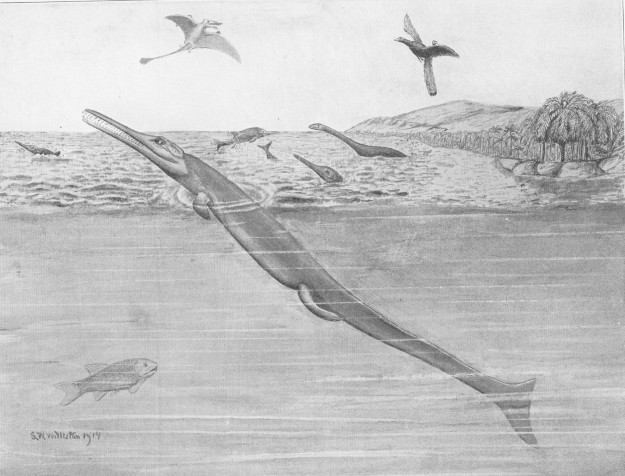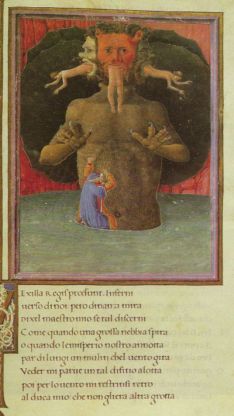The claims of Michel de Montaigne (1533-1592) and Francis Bacon (1561-1626) to seats among the moderns can hardly be denied– Montaigne is the heir of Sextus Empiricus, Bacon the father of Descartes and the modern experiment. Together, skepticism and the experimental method align as the twin pole stars of modern science. Sir Thomas Browne (1602-1682), a writer and thinker of unique power and extreme sensibility, occupies a more dubious position in relation to modernity. This is in spite of the fact that he outlived Bacon by sixty-four years, that he knew, at least partially, the writings of both Bacon and Montaigne, and was himself a contributor to several divisions of science and scholarly learning. He was also ever conversant with the latest advances in the sciences, as well as possessed of an intimate knowledge of the classics.
For Sir Thomas, Heaven was the abode of the mystic as well as the natural philosopher; but on earth, neither science nor the physician could change the destiny of any man, nor do anything to alter or destroy the truths of his mystic, apocalyptic faith. It is in this light that we must approach with caution the writings of Browne; particularly in those moments when he derides the Scholastics, seems to echo Montaigne, or speaks the language of Bacon and the Cartesians. The rejection of authority– be it the Divine Right of princes, the Ptolemaic system of the cosmos, or Aristotle’s concept of soul– was the common road traveled by those who made the so-called scientific revolution in the 17th century. Francis Bacon famously claimed that the Ancient natural philosophers had actually contributed little to the inquiry into the secrets of nature through their method, which Bacon styled “anticipations of nature.” If nature is not purpose-driven, if “soul” is not specific to anything, then nature is a machine made of parts that are separable and re-organizable. Like Galen’s medicine, or Pliny’s history, Aristotle’s theories of teleology and psychology, exhaustively elaborated through the period of the Middle Ages, faced its final opposition in the 17th century. Yet it was not on account of a rejection of religious faith and devotion that the change from Ancient to modern science came about, but through the division of the two spheres, faith and natural philosophy, into two vast categories of things relevance to the human condition.
In Montaigne, Bacon, and Browne, the arguments for the rejection of authority of the Ancients, and authority in general, come down to the notion that the hitherto unrealized worth of experience and experiment relieves contemporary intellectual life of its burden of gratitude and dogmatic adherence to the writings and opinions of the Ancients. Yet Browne’s rejection of Ancient authority, and authority in general, does not extend beyond what any sober-minded scholar might object to in the writings of an historian with a penchant for interjecting folklore into his narrative. On the other hand, derision of the authority of the Ancients is arguably a necessary component of the idiosyncratic style in Montaigne’s Essays — indeed, the belittling of authority, be it ancient or modern, religious or political, is the primary way to elevate the “self,” the “I,” to a new level of confessional authority, which is synonymous with autonomy. Bacon’s rejection of authority lends itself to his aphoristic style, which, in its “interpretive” lack of systematization, makes a mockery of Aristotle and the Scholastics for prematurely “anticipating nature” in their vast, artificially constructed systems. Thus, Montaigne, Bacon and Browne invoke the theme of the rejection of the authority of the Ancients to differing ends. In the final analysis, the rejection of authority is not so much a thematic parallel between the three writers, but rather a tendency in intellectual life distinguishing the 16th and 17th centuries from the Medieval era, when the writings of the Ancients were still being assimilated and commented upon.
The similarity of Browne’s writings to those of Montaigne and Bacon coincides in terms of a muscular skepticism. The main differences lie in Browne’s deference to the authority of religion. The authority of religion is arguably the meta-element in the thought of Browne; it is according to the precepts of religion that the world of ideas and opinions are entirely subordinated in his writings. This fideistic dimension is not a main characteristic found in Montaigne or Bacon’s writings, even though both frankly and regularly confess their lifelong devotion to the Christian religion. Allegiance, however, does not dictate the subject of their respective inquiries, whether it is the self or nature. Thus, by applying the fideistic distinction, some characteristic differences can be isolated between the thought of Browne and the early-modern thought of Bacon. In so doing, a more general concluding distinction can be drawn, and that is to identify an intellectual characteristic that differentiates the intellectual attitude of fully fledged modernity, such as we find it in the writings of Montaigne, from an attitude that points back to an earlier time in pre-modern intellectual life, such as we find it in the writings of Browne.
I. Science and Faith: Browne and Bacon
Browne recognizes in the precepts and dogmas of Christianity an absolute and final authority on all matters pertaining to man’s existence. It is perhaps on this characteristic head that Browne’s position is the most easily distinguished from the respective positions of Montaigne and Bacon. Browne never wavers in his application of his religious position to whatever the subject of his writings may be. On the other hand, Montaigne and Bacon vary from one work to the next in regard to the presence or absence of religion in the treatment of their respective subjects; they are resolute only on the point of obedience to the will of the Christian church. On the other hand, fideism begins and ends Browne’s argument — the ever-present memento mori and the consuming totality of an eternal God serve as a backdrop and a foil to the mutable aspirations and vanities of mankind.
The impotence of philosophy to lend support to faith or serve as the handmaid to theology is a notion that follows thoroughly in the wake of the activities and writings of Luther and Calvin. Following a notion found in the thought of both Luther and Calvin, Browne proposes that the Christian faith should be subjected to all the tribunals of history, as well as the scrutiny of science and philosophy, so that there might not be a single doctrine left intact or standing before the hubris of man, who pretends to the measurement of all things:
“As for those wingy mysteries in divinity, and airy subtleties in religion, which have unhinged the brains of better heads, they never stretched the pia mater of mine. Methinks there be not impossibilities enough in religion for an active faith: the deepest mysteries ours contains have not only been illustrated, but maintained, by syllogism and the rule of reason. I love to lose myself in a mystery; to pursue my reason to an O altitudo! ‘Tis my solitary recreation to pose my apprehension with those involved enigmas and riddles of the Trinity — incarnation and resurrection. I can answer all the objections of Satan and my rebellious reason with that odd resolution I learned of Tertullian, Certum est quia impossibile est.”
Certain contemporary critics of Religio Medici mistook Browne’s purpose of examining his religious opinions for a work of theology, yet in this fragment, Browne expressly abjures theologizing in his exclamation of “O altitudo!” The conditions of rationality set down by logic and syllogistic reasoning are not conducive to an active faith, which naturally repulses any rational explanation of faith’s irrational mysteries — rational thought is destructive and antithetical to the truths of faith. When, for example, the existence of God and the immortality of the soul can be proven through reason alone, faith ceases to act as knowledge without proof, and instead becomes certain knowledge. Religion, according to both the Reformers and to Browne, squanders its raison d’être, which is to say its veracity, when the truths of faith are changed to rationally acquired truths — the realm of faith is by definition irrational when opposed to the kingdom of reason, which is governed by empirical and logical norms. The authority of religion, based on the sovereignty of faith as opposed to the sovereignty of reason, must at least keep philosophy accountable, or enmity between the truths of faith and the truths of reason could give rise to the paradoxical possibility of the “double truth.”
In his Advancement of Learning, Bacon circumscribes the truths of faith without questioning the Scriptural authority from whence those truths issue. He does so in order to demonstrate that theology has nothing to add to natural philosophy, and certainly nothing to add to the investigation of empirical nature though methodic experiment. All observable phenomena stand outside the compass of divine knowledge for two reasons: there is no ascent from particular things and principles to universal things, or the first principles of science; second, knowledge of such things as the soul and its immortality cannot be acquired through knowledge of empirical particulars — the former species of knowledge is given through apocalypse, the latter through experience. Moreover, according to Bacon, the “light of nature” declares the existence of God to be self-evident because a creator is necessary to explain the existence of the material world; but the natural light is predictably silent on such things as the immortality of the soul and miracles. Through the light of nature, the knowledge of the existence of God is impressed on the understanding; hence, if nature can be explained by science without recourse to the miraculous or the divine, one has merely to accept the explanations of science, which do not require a miracle.
In the Religio Medici, Browne maintains a similar opinion on the self-evident nature of the existence of God; but rather than exclude God from participation in “the ordinary course of nature” (viz., laws of nature), “the effects of nature” are in every sense the “works of God, whose hand and instrument she only is; and therefore, to ascribe his actions unto her is to devolve the honor of the principle agent upon the instrument.” The difference between Bacon and Browne then, in respect to the authority of religion is, to take the case of Browne first, the function of religion as a totality beyond which nothing has meaning or reference. Science, history, and philosophy are all subsumed under the purposive ends of divinity, and employed as instrumental or artful servants. Divinity breaks in on Browne as he reviews his opinions touching hermeneutics, literally interrupting the flow of his discourse with, “thus I teach my haggard and unreclaimed reason to stoop unto the lure of faith,” and, “this, I think, is no vulgar part of faith, to believe a thing not only above, but contrary to, reason, and against the arguments of our proper senses.” Bacon, on the other hand, seeks to neither supplant religion with science nor make science accountable to religious principles — rather, he seeks to free scientific inquiry from any consideration of religion. Bacon’s programme of dividing disciplines in order that each may proceed in the most efficacious way requires that arts that were formerly joined, such as the “three knowledges; divine philosophy, natural philosophy, and human philosophy, or humanity,” pursue their respective ends individually, and draw their conclusions uninhibitedly.
The Baconian experimental method narrows the scope of what can be legitimately investigated by science, viz., the method begins and ends with the evidence of empirical phenomena.
While Browne’s approach to science in Pseudodoxia Epidemica includes experiment, induction is held to serve as nothing more than a corrective to man’s ignorance of phenomena — Browne is a castigator of false opinion sans the concern for generating a method or principles whereby science, or the inquiry into phenomena, will ultimately be freed from the bonds of superstition. In Religio Medici, Browne cavils about the same difficult doctrines that innumerable commentators have caviled on, but then invites the “gentle reader” to laugh with him at the folly of those who take such quibbles too seriously by holding the indubitability of the Scriptures too lightly. We find that Browne affects a similar pose in the empiricism of his scientific writings. The care for knowledge gained through the senses should be worn on the shoulders like a light mantle, to be cast off when the infallible truths of Scripture contradicts the fallible judgments men make of their experience. In his panoramic view of the charnel house of human history, Browne the Christian, and Browne the secular physician and scientist keep uncertain, even antagonistic company. Nature, as Browne writes in Religio Medici, is the work of God, and man cannot comprehend how the Creator works, save analogically, nor can he appropriate the tools of the Creator to achieve his own ends. Medicine is an artifice, and as such acts as a kind of mimesis of the infinite artificer; yet the application of medicine’s purgative and restorative powers, according to Browne, while beneficial to the cure of bodily infirmity, is adversative to the cure of souls. Medicine, according to this view, is antithetical to the plans of the Creator, as it necessarily works towards a greater human good, rather than as a means of serving a purpose in a transcendent teleological design that excludes individual human interests and desires. Browne has a different prescription for addressing the seeming irreconcilable differences of faith and reason, which is for each to keep to its respective place so as not to unnecessarily undermine the tenets of the one, while illegitimately raising the claims of the other.
II. Browne and Modernity
Browne is a paradoxical figure, but not in the same sense as Montaigne, who both refuses and accepts whichever category he is put into. The paradoxical nature of Browne is part and parcel of the age in which he lived, which is best understood in terms of irregularity rather than contradiction. The 17th century did not abide the kinds of impassible — which is to say, fashionable — cultural distinctions enjoyed in our current age between religion and science, the sacred and the secular, the state and the individual, &c. Certainly there were other sets of cultural distinctions particular to Browne’s time, but these are no longer operatives in our time.
Browne is ultimately an ambiguous figure, and is, to a certain (though not measurable) degree, representative of the paradoxical age in which he lived. Science lived in tolerable domesticity with religion; empiricism held rationalism at bay with its principle of bon sens; one could entertain Cartesian reductionist notions of thought and extension and still be a loyal Aristotelian. Browne may present himself in the guise of the scourge of vulgar and popular error, but he is never willing to sacrifice his religious faith, or even suggest such a desperate outrage to promote man’s self-important ends, or mix the tenants of faith with the necessarily imperfect principles of the natural sciences. Rather, Browne’s singular principle of the inevitability of the grave, and the eternal life to come, stands above rational judgment altogether, and does not waver or equivocate at any turn — hence, this may be justly set down as Browne’s “Archimedean point,” the negative principle with which all positive knowledge must be reckoned. But death does not admit of any “sic et non,” or any logical conveniences like the universal or particular affirmation or negation. The study of life and death, Brown writes in the Epistle Dedicatory to Thomas Le Gros in his Hydriotaphia or Urn Burial, makes up the daily operation of men such as themselves. The locus of their enquiry is the whole of the earth, for as such, it is but a vast tomb. The ax, spade and brush are but tools for exhuming the curious relics of man, the rational animal, whose dual essence gives him over to the ceremonialization of his own transience, yet whose fondest wish is but to continue in existence, and perpetually evade the extinction that mortal destiny carries with it. Funeral customs are geographically and chronologically particular things, but “the end of all, the poppied sleep” that gives occasion for so much variation in man’s funerary practices, is an ultimate and universal phenomenon. Browne’s Platonism is borne out by his persistent opposition of the fleeting to the eternal. The sensuous curtain of the phenomenal world, according to Browne, is a deception and a cheat when considered superficially, or as its own end. The immutable truths of the existence of a Creator that is both transcendent and participatory in the created order, and an immortal human soul, are necessary foundations for any kind of inquiry into the truth of things. In Browne’s writings, it is this particular combination of objective fact and religious devotion — les extrêmes qui se touchent — that renders the scope of his writings at once wider and narrower than the scope of Montaigne in the Essays, and Bacon in his scientific treatises. For instance, Browne’s objective inquiry on funerary urns rapidly gives way to a lengthy meditation on the gloomy spectacle of other men’s relics, ashes, or tombs, as the case may be. His most well known writings, the Urn Burial and Religio Medici, consist mainly of sustained digressions on his preferred themes of God, the mysteries of the faith, and mortality and immortality; but perhaps this is so only because his subjects inevitably relieve themselves of their particularities in the ubiquitous lap of the Creator.






